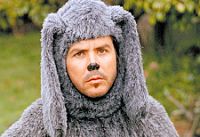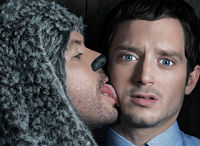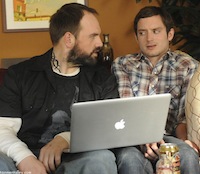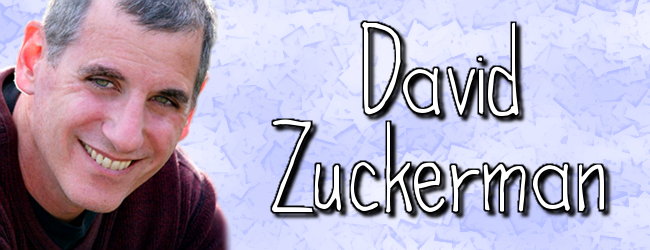David Zuckerman is the showrunner for the wildly popular FX series Wilfred. Mr. Zuckerman has been in the industry for over twenty years. His credits include the long running animated comedies Family Guy, King of the Hill and American Dad.
Jason: How did you get your start in the industry?

The Fresh Prince of Bel Air
J: We have interviewed many writers that tell us the pains and joys of scriptwriting. What is the writing process like for you?
DZ: I like having written more than I like actually writing. It’s a very lonely process; I really love writers’ rooms. I love working in a room with a bunch of other funny people, crafting stories and re-writing scripts. It depends on the project though, some shows are more fun to write for than others, some shows take a little more work and a little more patience, but my process is to constantly re-write as I go. I wish I could get a first draft out and go back and revise, but unfortunately I keep revising so by the time my first draft is done, it’s actually pretty close to my final draft.
J: You’ve written on both animated series and live action shows. Do you prefer one to the other?
DZ: There is an immediacy to live action that’s great. Especially if you’re on an audience show. By the end of the week, its shot, done and in the can. On a show like Wilfred our production schedule is longer because we shoot several episodes at a time, more like a film schedule. In animation the development of a script can take up to a month and a half. From script completion to the time the show gets on the air it’s almost a full year. That’s a long time to wait. The good thing about that is a lot of times the jokes are fresh when you watch them because you wrote them a year ago and you don’t really remember them, so you get an honest read on it. The other thing about animation is you get exactly what you want. You can get the actors to record the lines many different times and in many different ways. The animators can animate a gag so that it works perfectly. In live-action, you’re a little bit more at the mercy of the actors and their interpretations. The laws of physics and gravity apply in live-action and not in animation. Each has its own advantages and disadvantages
J: You are showrunning the hit FX show Wilfred currently completing its first season. What attracted you to the material?

Jason Gann as Wilfred
J: Due to the chemistry of the cast and subject matter many fans feel that Wilfred is loosely scripted and largely ad-libbed. Is this correct?
DZ: That’s interesting, I had the same reaction to the Australian show and Jason (Gann) told me that it was very tightly scripted. Ours is entirely scripted because it’s very densely plotted and we have to keep track of all the threads and make sure everything gets set up correctly. Jason is in the writer’s room when we are preparing the script, I think he does a lot of his improvising then, but once we get down to the stage it’s tightly scripted. If there’s any deviation it’s only done with writer approval, otherwise we might lose an important beat. There’s almost no improvisation.
J: You’ve got an excellent cast on the show. How did Elijah Wood’s casting come about?

Jason Gann & Elijah Wood
J: Jason Gann, who played Wilfred in the Australian version, reprises his role here. Was there ever talk of replacing him with an American actor?
DZ: When I met with the producers for the project it was presented to me as “We want Jason to stay on board,” and I thought, “great.” It was very hard for me to imagine someone else in the role. Before I came on the project they were throwing around names like Zach Galifianakis and people like that who probably would have been amazing, but Jason is Wilfred. It would be very hard for me to imagine the show or that character played by another actor. Jason is extraordinary and also I think the idea that he is an unknown to American audiences is helpful in making the character a little more mysterious and dangerous. If it was the lovable Zach Galifianakis or someone like that, I think some of the threat and danger of the character wouldn’t be there.
J: Wilfred has an off-beat dreamlike quality form the writing to the music and lighting. Was that something you strived for creatively?
DZ: Exactly, the goal was always to do something surreal and dreamlike. There’s an extraordinary amount of attention to detail on the show, from the writing, to the direction by Randall Einhorn and Victor Nelli, and our DP Brad Lipson. The way the show is lit and shot on Canon 5D’s and 7D’s, which are basically still cameras, we get a look with such a shallow depth of field that it really evokes Ryan’s state of mind. The level of the performances, particularly Jason and Elijah’s, are carefully calibrated. There are a lot of clues and small easter eggs that we drop into each episode. I read a lot of the online chatter and some people will catch things, but there’s a lot of stuff that people don’t catch. I’m curious to see once the DVDs come out, if on repeated viewing, people spot things they maybe missed the first time. The tone is very calculated; it’s amazing how well we’ve achieved what I’d hoped for because a million things could have gone wrong. Especially on our budget and schedule, we have a quarter of the budget that most sitcoms have and we shoot everything in less than four days per episode, it’s amazing this all came together and it’s because everyone works so extraordinarily hard.
J: During the first season many famous faces popped up in various roles. How were you able to get such high-profile actors to appear on a relatively unknown show?

Ethan Suplee & Elijah Wood
J: It was recently announced Wilfred will be renewed for a second season. What are some things fans can expect in the coming episodes?
DZ: We have an overall vision for the show, but in terms of particulars, we haven’t broken any stories yet. We’re putting it all together, it’s very likely that Ryan will get a job this year and obviously we have some stuff to resolve from the season finale. Once we take care of that business, Ryan will continue to progress in his recovery and he’ll also experience some setbacks
J: Can you tell us about your experience working with the FX network?


